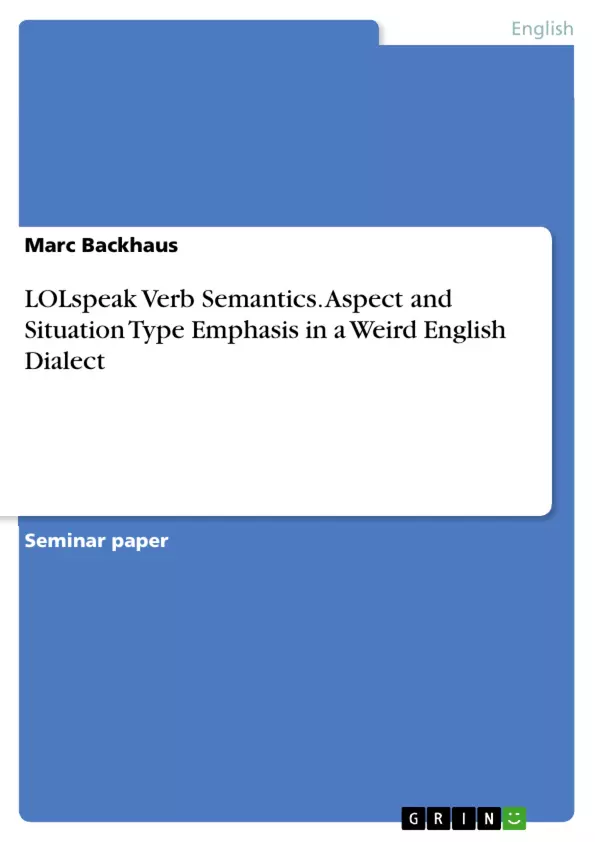LOLspeak has established itself as a remarkably distinct form of online English language. The dialect used in memes with LOLcats has developed from being a Netspeak offspring slang used "to make amusing text for funny cat pictures" to a language phenomenon with "regularities and patterns" that make it "a complex and systematic reimagining of the English language". It has transgressed its meme boundaries and manifested in commentary forums, the bible rewrite "LOLcat Bible Translation Project" – and has become the subject of a number of academic works.
From a verb semantic point of view, LOLspeak jumps directly into the eye with its simplification and regularisation of verbs. The dialect in fact seems to be putting strong emphasis on the verb and its function amidst a sentence by shifting not only several grammatical components, but in this way also the aspect & situation type the verb and its correlating items in a sentence operate in. In doing so, it seems to be stressing the importance of the verb in this context as well as making aware of what in fact and in detail composes the aspect and situation type of a sentence.
Is LOLspeak threfore a dialect of English that is worth appraising linguistically for its instructive & educational value – or is it a simple "language play" that rather bears the contrary effect and degenerates the English language with its shifting and breaking of linguistic rules?
Table of Contents
- Introduction
- Basic Linguistic Features & Previous Analysis
- Situation Type Shift & Emphasis
- i. through point-of-view shift
- ii. through verb swap
- iii. through noun/verb omission
- iv. through tense shift
- v. through verb function play
- Conclusion
Objectives and Key Themes
This paper examines the verb semantics of LOLspeak, a distinct form of online English language, and specifically investigates the shift and emphasis of situation types within the dialect. The paper aims to analyze how LOLspeak manipulates grammatical components and aspects of verb function to influence the perception of verb aspect and situation type. The objective is to determine whether LOLspeak, despite its playful nature, offers linguistic value as an instructive example of verb aspect and situation type, or if it merely represents a "language play" that degenerates the English language.
- The linguistic features and structure of LOLspeak.
- The shift and emphasis of situation type in LOLspeak.
- The relationship between LOLspeak and standard English.
- The potential linguistic and educational value of LOLspeak.
- The impact of LOLspeak on the English language.
Chapter Summaries
The introduction provides an overview of LOLspeak as a distinct form of online English language, highlighting its origins and evolution. It discusses the dialect's focus on verb function and its potential for altering verb aspect and situation type. The chapter also outlines the paper's objectives and the question it seeks to answer.
The "Basic Linguistic Features & Previous Analysis" section reviews previous academic analyses of LOLspeak, focusing on its linguistic traits and their impact on the dialect's structure and definition. This chapter explores the language variation and patterns observed in LOLspeak, highlighting its characteristics and its relationship to standard English.
The "Situation Type Shift & Emphasis" chapter delves into the specific ways in which LOLspeak manipulates situation type. The chapter focuses on various linguistic strategies employed by LOLspeak to alter the perception of verb aspect and situation type, analyzing examples of point-of-view shift, verb swap, noun/verb omission, tense shift, and verb function play.
Keywords
LOLspeak, verb semantics, aspect, situation type, dialect, online language, internet slang, language play, linguistic features, meta-awareness, language variation, standard English, non-standard English, linguistic patterns, education.
Frequently Asked Questions
What is LOLspeak?
LOLspeak is a distinct online English dialect that originated from "LOLcat" memes. It is characterized by playful, systematic reimagining of grammar and spelling.
How does LOLspeak manipulate verb semantics?
The dialect emphasizes verbs through simplification, regularization, and shifting components like tense, aspect, and situation type to create humorous effects.
What are "situation types" in linguistics?
Situation types refer to the inherent temporal nature of a verb's meaning (e.g., whether an action is a state, an activity, or a sudden event).
Is LOLspeak considered a "language play" or a degeneration of English?
The paper discusses this debate, questioning if it has educational value by highlighting linguistic rules through their "breaking," or if it simply degrades standard English.
What is the "LOLcat Bible Translation Project"?
It is a large-scale project where the entire Bible was rewritten in LOLspeak, demonstrating the dialect's complexity and its move beyond simple image captions.
What linguistic strategies are used in LOLspeak to shift meaning?
Strategies include point-of-view shifts, verb swaps, omitting nouns or verbs, and intentional tense shifts (e.g., "I can has cheezburger").
- Arbeit zitieren
- Marc Backhaus (Autor:in), 2014, LOLspeak Verb Semantics. Aspect and Situation Type Emphasis in a Weird English Dialect, München, GRIN Verlag, https://www.grin.com/document/288755



